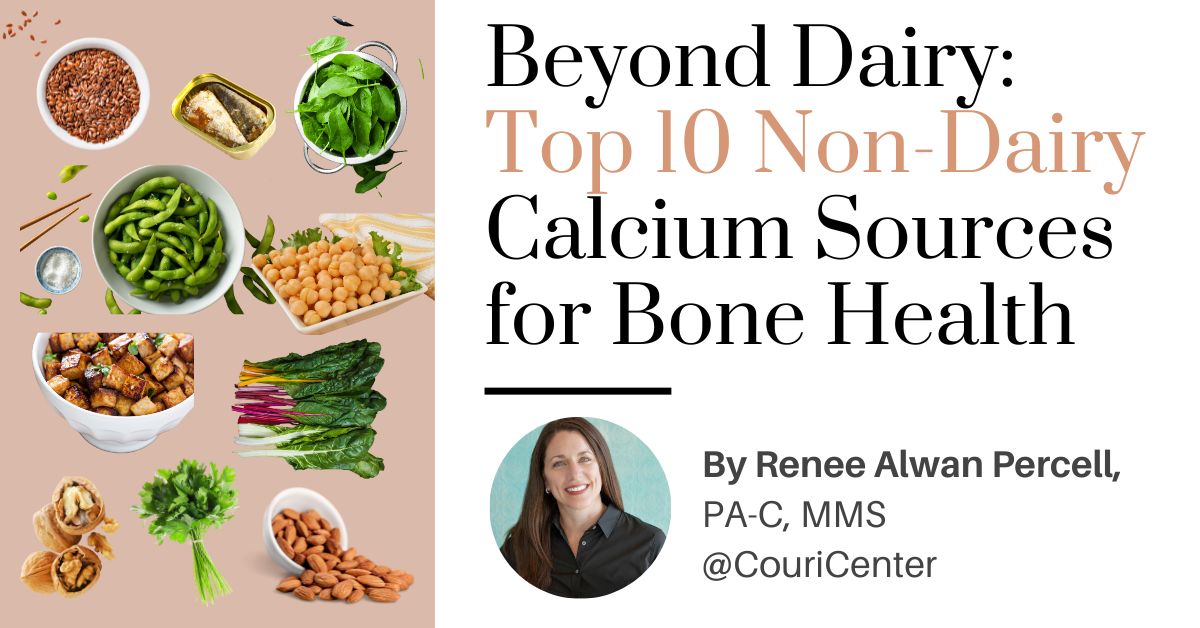
Summary
Discover the integrative approach to strong, resilient bones with our latest blog by Renee Alwan Percell, MMS, PA-C at the Couri Center. Dive into the crucial role of calcium intake for women's wellness, while uncovering diverse dietary sources and essential insights to prevent osteoporosis. Elevate your approach to bone health through integrative practices such as weight training, limiting sugar and reducing inflammation. Ready to strengthen your bones and empower your body? Schedule a bone health consult with us today.
Understanding Your Calcium Needs
Diet and bone health are essential for men and women. Bones require calcium to be healthy and strong. Increasing your daily calcium intake through your diet can help to ensure you get the calcium you need. It is important to consider your bone health because studies suggest that approximately one in two women and one in four men age 50 and older will break a bone due to osteoporosis. The consequences of these fractures can be devastating.
The US Recommended Daily Amount (RDA) of calcium for women aged 50 or less is 1,000 mg per day and 1 200 mg per day for women over 50. For men, the recommendation is 1,000 mg per day up to 70 years, increasing to 1,200 mg per day thereafter.
There are two primary forms of calcium in supplement form: calcium carbonate and calcium citrate. Calcium carbonate should be taken with food, and calcium citrate can be taken on an empty stomach or with food.
Beyond Dairy: Exploring Non-Dairy Calcium Sources
You can also get calcium in your diet, and a common misconception is that calcium is only found in dairy. There are many non-dairy forms you can include in your diet that are rich in calcium. Calcium amounts in your food can be found on the US Department of Agriculture (USDA) Food Data Central database.
Sardines
Canned sardines with the bones have 1000mg of calcium per cup. They also are loaded with omega-3 fatty acids.
Parsely
One cup of sliced and boiled parsley has 912 mg of calcium.
Almonds
660 mg per cup
Flax seeds
610 mg per cup
Soybeans
426 mg per cup
Tofu
516 mg per cup
Garbanzo beans
340 mg per cup
Walnuts
280 mg per cup
Spinach
250 mg per cup
Swiss Chard
125 mg per cup
Bone Health: An Integrative Lifestyle Approach
Supplements are only part of the equation for a healthy life. While Calcium is vital for bone health, it is a perfect blend of a healthy lifestyle that can impact bone health. Inflammation is a primary factor that contributes to bone loss. A sedentary lifestyle, smoking, alcohol, and sugar consumption encourage inflammation and can negatively impact not only your bones but overall health in general. Being mindful of not only supplementation but also your daily lifestyle will optimize your best self.
Take Charge of Your Bone Health
It is important to know the small things you can incorporate into your lifestyle that your body will thank you for later. At the Couri Center, we’re committed to helping you understand and optimize your bone health. Our team can provide personalized guidance and support, empowering you to make informed decisions for a healthier future. Contact our office today for a bone health consult and embark on your journey to stronger bones and greater well-being.
Be well,
Renee Alwan Percell, MMS PA-C
DISCLAIMER: THE INFORMATION PROVIDED ON THIS WEBSITE IS INTENDED FOR GENERAL INFORMATIONAL PURPOSES ONLY AND IS NOT INTENDED TO BE A SUBSTITUTE FOR PROFESSIONAL MEDICAL ADVICE, DIAGNOSIS, OR TREATMENT. THE INFORMATION PROVIDED IS CURRENT AS OF THE DATE OF PUBLICATION OR LAST REVIEW, BUT MEDICAL KNOWLEDGE IS CONSTANTLY EVOLVING, AND THE INFORMATION MAY BECOME OUTDATED OVER TIME.
References:
https://ods.od.nih.gov/factsheets/Calcium-Consumer/
https://www.bonehealthandosteoporosis.org/patients/what-is-osteoporosis/
